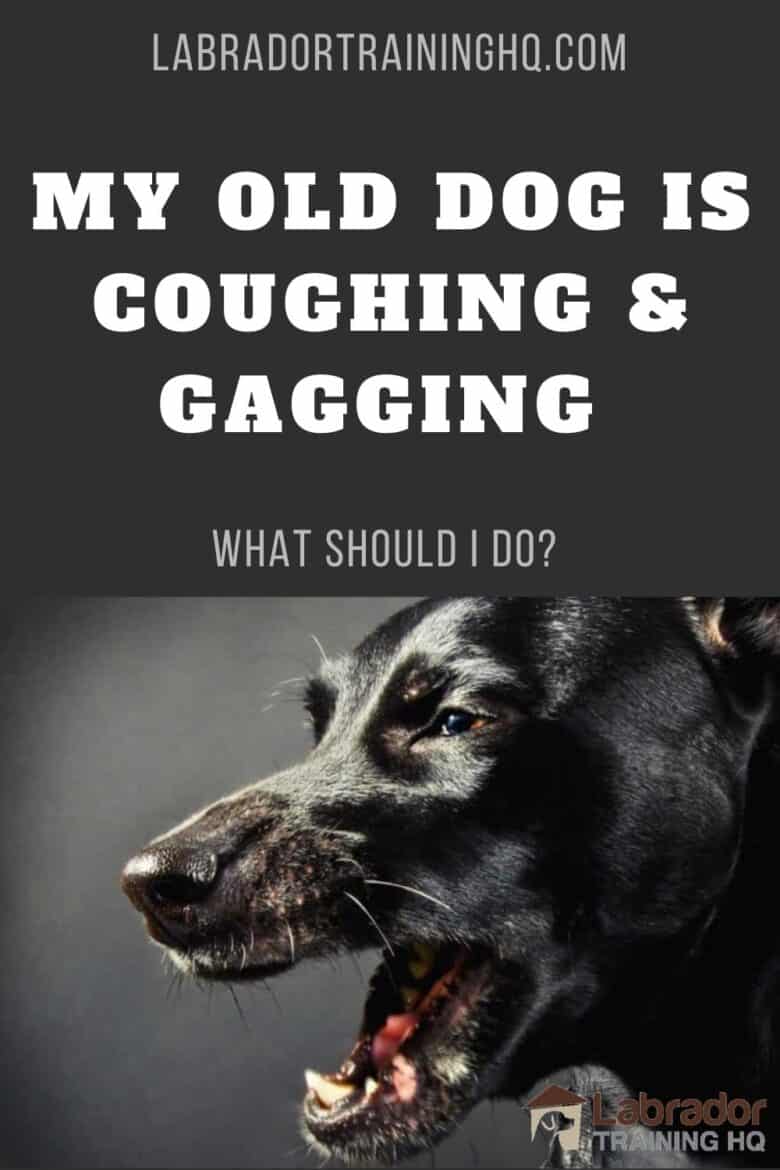This post may contain affiliate links. We may earn money or products from the companies mentioned in this post.
As your dog gets older, it is natural to start worrying about them and become concerned when they show symptoms of declining health, such as coughing and gagging.
While coughing and gagging can be a symptom of a minor illness, just like in humans, it can also be an indication that your older dog has developed a more serious medical condition that requires veterinary attention.
Read on as we look at the differences between coughing, gagging, and vomiting in dogs, and the most common causes of coughing and gagging, especially when it comes to older dogs.
We’ll also suggest what you should do if you notice your dog is coughing or gagging and when to start worrying.
We’ll also share some of the best over-the-counter and home remedies that you can use to soothe your dog’s throat when they are suffering from a cough.
DISCLAIMER: We are not veterinarians. If your dog is coughing or gagging you should contact your veterinarian immediately.
Contents & Quick Navigation
Coughing, Gagging, Or Vomiting

Not everyone has a clear idea of the difference between coughing, gagging, and vomiting in dogs, but the three are quite different.
It is important that you can tell the difference, as your vet will want to know exactly what is happening with your dog to make an accurate diagnosis.
A cough is when your dog sharply expels air from their mouth but doesn’t bring anything up with it.
A bit of saliva or mucus that was already in the mouth or nose might be expelled, but they aren’t bringing up any contents from their stomach.
Vomiting is when they bring up their stomach contents. It is usually quite obvious when your dog vomits as you will be cleaning up their stomach contents from the floor.
That is, of course, unless they eat it first. You don’t need to worry too much about this; it is not uncommon for dogs to eat their own vomit.
Gagging is a non-scientific term of something in between coughing and vomiting.
Your dog will open their mouth wide and look like they want to bring something up, but they won’t generally bring anything up aside from a little saliva and mucus.
Gagging often happens just before or after coughing, and it can sound like your dog is trying to cough and vomit at the same time.
When To See Your Vet?
A one-off bout of coughing or gagging isn’t generally something to worry about. It could just mean that something has made its way into their airwaves and they are pushing it out.
This is just like you, but it could be a bit of dust or something more substantial like a dead insect. Coughing or gagging lets them expel the unwelcome contaminant, and they should be fine.
However, if your dog, especially if they are older, is coughing fairly regularly for a period of more than 48 hours, it is time for a trip to the vet. This suggests that it is a symptom of something more serious.
When you see the vet, they will want to know whether your dog was coughing, gagging, or vomiting, the frequency of the bouts, and how long this has been going on.
So, make sure you make a careful note of these things. Also, look out for anything that might trigger the cough, such as exercise or entering a certain environment.
This will help your vet make an accurate diagnosis and suggest a course of treatment.
Causes Of Coughing And Gagging In Older Dogs
There are a variety of reasons why your older dog might suffer from episodes of coughing and gagging.
Some are relatively treatable, while others are linked with illness associated with aging and will require more serious medical intervention.
These are the most likely causes of coughing and gagging in older dogs.
Kennel Cough
Kennel cough is a bit like a common cold in that it is a contagious infection of the upper airways that passes between dogs, and is frustrating but not serious.
You minimize your dog’s chances of picking this up by having them vaccinated, especially before they pass time in a kennel or with a group of other dogs.
With kennel cough, the coughing is more prevalent than the gagging. The best treatment is time, and an agent to calm the airwaves if needed.
Like the common cold, it will usually go away on its own with rest and a nice, healthy diet. In normal circumstances, you should expect the symptoms to last one to two weeks.
While kennel cough isn’t serious, it is important to monitor your dog. If complications develop, kennel cough can progress into pneumonia.
Additional symptoms are likely to appear such as vomiting, loss of appetite, and fever.
When Stetson was young and stayed at the guide dog kennel regularly he came back a few times with kennel cough. He would cough then do a horrible gagging sound, but nothing came up.
Fortunately, Stetson’s kennel cough never progressed to anything worse then a coughing and gagging for a short period of time.
We regularly gave Stetson the Bordetella vaccine to help prevent kennel cough, but it didn’t seem to always to the job.
Heart Cough
Probably the most common cause of coughing and gagging in older dogs is heart cough. This is a symptom of heart disease and occurs when the ailing heart is no longer able to pump blood properly.
As a result, blood can accumulate and stagnate in the lungs. The fluid then leaks into the airways, and your dog will cough to try and eliminate the accumulation.
Coughing is a more common symptom than gagging, and the cough will probably sound quite wet and liquidy. It will require treatment of the underlying heart condition, probably using medication and a managed diet.
A heartworm infestation can cause similar symptoms. But this can be avoided with regular use of a heartworm preventative and periodic checkups for parasites.
Unfortunately, our lab-mix, Linus had heart problems in his later years. We first learned about his ailment when we noticed he started coughing and gagging. Our first thought was kennel cough, but after a visit to the vet he was diagnosed with congestive heart failure.
Cancerous Tumor
Another common cause of a consistent cough in older dogs is a cancerous tumor in the lungs.
They can develop these if they live in an environment where there is passive smoking or in a highly polluted area.
However, it is most common that cancer in the lungs is a secondary tumor caused by cancer somewhere else in the body.
This will sound like a persistent wet cough and may be accompanied by other symptoms such as lameness or limping. This is because this kind of cancer also causes bone inflammation.
Your vet will need to determine the source of the cancer in order to suggest a viable treatment.
In his later years Stetson was diagnosed with cancer. We didn’t learn he had the disease until he started coughing. Again it sounded like kennel cough, but after a visit to our veterinarian and a battery of tests they discovered he had cancer.
Laryngeal Paralysis
If your dog is both coughing and gagging, laryngeal paralysis is a likely cause. This illness is also especially common in labrador retrievers as they get older.
You can read about other common labrador health conditions here.
It occurs when the dog loses control of the muscles and nerves that manage their laryngeal function.
They can still breathe, but not as much air is passing through their larynx and into their lungs as normal. They might cough or gag to try and let more air through.
Symptoms most often appear when they are eating, excited, or exercising. The symptoms tend to gradually worsen over time.
There are several surgical options available to alleviate this problem.
Asthmatic Or Allergic Cough
An asthmatic or allergic cough can affect dogs of any age. It is a response to irritants in the air your dog is sensitive to.
This includes smoke, pollen, and dust. When this is the problem, it is usually accompanied by other symptoms, such as running eyes.
If the condition comes on suddenly, it is often a result of a change in the environment. A common culprit is a new household cleaner, so consider any changes you have made to your home and garden.
This type of cough is highly treatable with environmental control and allergy medications.
Collapsing Trachea
Some dog breeds, such as Daschunds, poodles, and any dogs crossed with a poodle such as a labradoodle or goldendoodle, are prone to a collapsed trachea, which can cause an unpleasant cough.
The trachea or windpipe is held open by a ring of cartilage that can become weakened over time.
As a result, when the animal gets excited, their airways may collapse, provoking a coughing and gagging spell, as they struggle to unlock their airways.
While there are medications that can help, there is no cure for this condition. The best treatment is keeping your dog calm and having strategies to calm them down quickly when this does occur.
Weight Gain
We don’t always notice when our dog gains weight, so we might not notice that their collar has become uncomfortably snug.
If your dog starts coughing and gagging frequently, and you think they have put on weight, make sure you can comfortably fit two fingers under their collar.
It is not uncommon for dogs to gain weight as they get older because their metabolism slows down and they tend to have less energy. So, it might just be a matter of loosening their collar.
However, you should also talk to your vet to make sure they are a healthy weight. They may suggest changes in their diet to accommodate their lowered metabolism and more sedentary lifestyle.
Cough Remedies
You are no doubt accustomed to taking something to soothe your throat when it is raw and sore from coughing, so you are probably wondering if there is anything similar you can give your dog?
There are a number of things you can give your dog depending on the cause of their cough. But make sure you don’t just use these to cover the symptoms. The underlying cause will need treatment as well.
1. Fur Goodness Sake Breathe Gold Kennel Cough Supplement
This dietary supplement can be used to alleviate the symptoms of kennel cough and help speed up the healing process for your pooch.
It contains natural ingredients, including marshmallow root, mullein leaf, and angelica root that soothe the respiratory tissue.
It is a liquid supplement that should be added to your dog’s wet food or water.
2. PetHonest Allergy Relief Immunity Strength & Digestive Health Soft Chews
If the cause of your dog’s cough is allergies or irritants, these natural soft chews may help.
Made from colostrum, turmeric, and salmon oil, and enriched with probiotics and vitamin C, they can help reinforce a weak cut and boost the immune system.
These tasty chews can be fed to your dog daily as a treat.
Natural Remedies
You may also want to experiment with natural remedies, such as honey. Half a tablespoon mixed with water three times a day can have a great soothing effect.
You can also mix in a teaspoon of coconut oil for an extra soothing boost.
FAQs
Why Does My Dog Keep Coughing And Gagging Like He’s Choking?
Consistent coughing and gagging can be a symptom of a number of medical conditions in dogs. When it comes to aging dogs, the most likely causes are heart disease, lung cancer, and laryngeal paralysis.
For a proper diagnosis, make a note of the nature of your dog’s coughing and gagging symptoms, when they happen, how long they last, and any noticeable triggers.
This will help your vet determine the cause of the problem.
What Can I Give My Dog For Coughing And Gagging?
If your dog is coughing or gagging, you should speak to your vet to identify the underlying cause of the problem and treat it at its source. However, there are things you can give your dog to soothe their throat.
A homemade mixture of half a tablespoon of honey and a teaspoon of coconut oil mixed with water can be very soothing when administered three times a day.
If your dog’s cough is caused by allergies, or they have caught kennel cough, there are also a number of over-the-counter remedies you can buy to soothe and help the problem pass more quickly.
When Should I Be Concerned About My Dog’s Cough?
If your dog lets out the occasional cough, this is nothing to be worried about you. Just like with you, something has entered the breathing pathways that shouldn’t be there, and they are getting it out.
Do Older Dogs Cough More?
However, if your dog continues to cough and/or gag for a period of more than 48 hours, it is time to talk to your vet. This usually suggests there is something more serious behind their coughing fits.
You may notice your older dog coughing more often than when they were younger. This is because they have a lowered immune system, and so are more likely to catch common coughing illnesses, such as kennel cough.
This is also because a variety of illnesses that tend to come on in older age are also accompanied by coughing.
If your dog starts coughing and gagging constantly, this is not something to be ignored. Take them to your vet for a diagnosis.
It could be a common kennel cough or it could be a symptom of something serious such as heart disease.
What Are The Signs Of A Dog Dying Of Old Age?
Coughing alone is not a sign that old age is catching up with your dog and that they are on their last legs. However, it can be a symptom of serious illnesses that could be terminal if left untreated.
If your dog is entering its final days, more common symptoms are a loss of appetite, vomiting and incontinence, a lack of coordination, extreme fatigue, and a desire to do nothing.
In the final hours, they will probably go off on their own, as dogs tend to hide when they know that their time is up.
How Did My Dog Get Kennel Cough At Home?
Like the human cold, kennel cough is caused by very common bacteria. While dogs catch it most often when mixing with other dogs, they can pick it up anywhere.
It is not a serious condition, but if you are worried about your dog picking up kennel cough, there is a vaccine available to prevent it.
The Verdict
If your older dog develops a consistent cough or starts gagging on a regular basis, this can be a symptom of a more serious medical condition that will require treatment.
If your dog’s cough does not go away by itself within about 48 hours, it is time for a trip to the vet.
Make a note of whether they are coughing, gagging, or vomiting and the length and frequency of the bouts. You can then work with your vet to make a diagnosis.
While asthma and allergies or kennel cough are common causes of coughs in dogs of all ages and are easily treatable for older dogs, coughing can also be a sign of more serious medical conditions.
Common ailments are heart disease, lung cancer, and laryngeal paralysis.
But with proper treatment and care, your dog can still live a happy life for years to come.
Have you dealt with an older dog with a persistent cough or regular gagging?
Share your experiences with the community in the comments section below.
Save To Pinterest

Top Picks For Our Dogs
- BEST PUPPY TOY
We Like: Snuggle Puppy w/ Heart Beat & Heat Pack – Perfect for new puppies. We get all of our Service Dog pups a Snuggle Puppy. - BEST CHEW TOY
We Like: KONG Extreme – Great toy for heavy chewers like our Labrador Retrievers. - BEST DOG TREATS
We Like: Wellness Soft Puppy Bites – One of our favorite treats for training our service dog puppies. - BEST FRESH DOG FOOD
We Like: The Farmer’s Dog – A couple months ago we started feeding Raven fresh dog food and she loves it! Get 50% off your first order of The Farmer’s Dog.
For a list of all the supplies we get for our new service dog puppies check out our New Puppy Checklist on the PuppyInTraining.com blog.
What Does It Mean When Old Dogs Start Coughing And Gagging? was last modified: February 28th, 2021 by


